人教版PEP小学英语六年级知识要点及习题总复习讲义
人教版PEP小学英语六年级知识要点及习题总复习讲义.doc

山林小学人教版PEP山林小学英语六年级知识要点及习题总复习讲义名词复数规则1.一般情况下,直接加-s,如:book-book s,bag-bag s,cat-cat s,bed-bed s2.以s.x.sh.ch结尾,加-es,如:bus-bus es,box-box es,peach-peach es, watch-watch es3.以“辅音字母+y”结尾,变y为i, 再加-es,如:famil y-famil ies, strawberr y-strawberr ies4.以“f或fe”结尾,变f或fe为v, 再加-es,(但有一个特例:roof→roofs)。
如: kni fe-kni ves lea f-lea ves wife-wivesthief-thieves wolf-wolves5.以“o”结尾的单词,如果有生命,加-es;如果没有生命,加-s。
如:①有生命:potato-potato es tomato-tomato esmango-mango es(芒果)hero-hero es(英雄)Negro- Negro es (黑人)②没生命:radio-radio s piano-piano s photo-photo szoo-zoo s6.不规则名词的复数变化:(一)完全不规则:m a n-m e n woman-women policeman-policemenpolicewoman-policewomen mouse-mice child-children f oo t-f ee t tooth-teeth goose-geese(二)单数复数同形:fish-fish sheep-sheep deer-deerpeople-peopleChinese-Chinese Japanese-Japanese 小练习:写出下列各词的复数I _______ him ______ this ______ her ______ watch _______ child ______ photo ______ diary______day______foot_______ book______ dress _____tooth______ sheep ______box_____ strawberry ________ leaf ____ potato ______ peach______ bus ______ man______ woman______ paper_______ juice______ water________ milk________ rice__________ tea__________一般现在时态一般现在时基本用法介绍1.一般现在时的功能1).表示事物或人物的特征、状态。
新PEP小学英语六年级上册期中复习知识点总结及练习(打印版)

学校 班级 考号 姓名__________________________ 密 封 线PEP 人教版六年级英语上册 六年级上册期中复习要点Unit 1 How Do You Go There ?一. 知识点归纳 (一)、 词汇bike ( 自行车乘坐)公共汽车(脚)火车(怎样) 飞机(上学) 轮船)subway ( 地铁) ( 交通工具前加by , 表示乘坐但步行要用on foot )fifth 第五 remember 记住 find 找到 difference 不同 same 相同的 every 每个 所有的三会 country 国家 mean 意思是 drive 驾驶right 右边的 side 边 England 英国 Australia 澳大利亚 however 但是 left 左边的 if 如果 must 必须(二)、重点句型① 询问交通方式用疑问代词how⏹—— How do you go to school ? 你怎样去上学?—— I go to school on foot . 我走路去上学。
⏹—— How do you go to Canada ? 你怎么去加拿大。
—— I go by plane . 我坐飞机去。
⏹—— How does your father go to work ? 你父亲怎样去上班? —— He goes to work by subway . 他坐地铁去上班。
② 询问地点,用疑问代词where⏹ —— Where is your home ? 你家在哪里?—— It’s near the post office . 在邮局旁边。
⏹ —— Where are the teachers ? 老师们在哪儿? —— They are in the teacher’s office . 在老师的办公室。
人教版③问路⏹—— How can I get to Zhongshan Park ? 我怎么去中山公园?—— You can go by the No.1 bus.你可以坐一路车去。
人教版pep六年级英语总复习知识点完整版

人教版p e p六年级英语总复习知识点HEN system office room 【HEN16H-HENS2AHENS8Q8-HENH1688】六年级总复习一、词汇Ⅰ一般过去时态一般过去时态表示在过去的某个时间发生的动作或存在的状态,常和表示过去的时间状语连用。
例如yesterday, last weekend ,last Saturday ,等连用。
基本句型:主语+动词的过去式+其他。
例句——What did you do last weekend?你上周做什么了?——I played football last weekend.我踢足球了。
★规则动词过去式的构成⒈一般在动词原形末尾加-ed。
例如:play—played⒉词尾是e的动词直接加-d。
例如:dance—danced⒊末尾只有一个辅音字母的重读闭音节词,先双写这个辅音字母,再加-ed。
例如stop(停止)--stopped⒋结尾是“辅音字母+y”的动词,变“y”为“i”,再加-ed,例如:study--studied★一些不规则变化的动词过去式am/is—was are—were go—went swim—swam fly—flew do—did have—had say—said see—saw take—took come—came become—became get—got draw—drew hurt—hurt read—read tell—told will—would eat—ate take—took make—made drink—drank sleep(睡觉)—slept cut(切)--cut sit(坐)—satbegin(开始)—began think—thought find—found run(跑)---ran buy—bought win—won give(给)—gave sing—sang leave—left hear(听)--heart wear—woreⅡ一般现在时态一般现在时态表示包括现在时间在内的一段时间内经常发生的动作或存在的状态,表示习惯性或客观存在的事实和真理。
pep小学英语六年级上册unit1复习资料及复习题
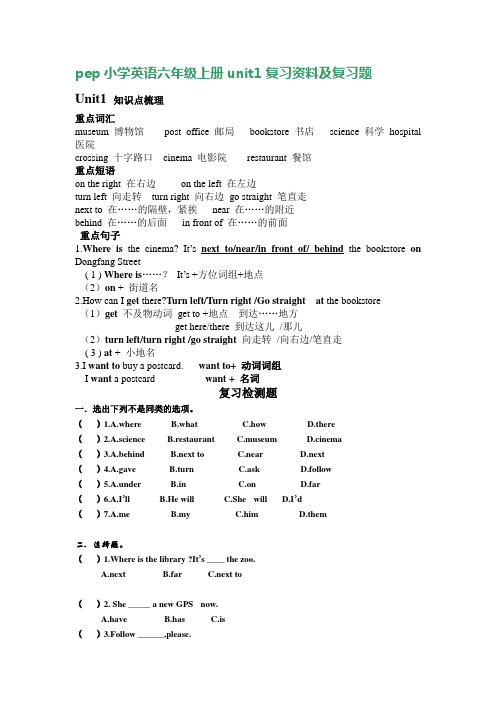
pep小学英语六年级上册unit1复习资料及复习题Unit1 知识点梳理重点词汇museum 博物馆post office 邮局bookstore 书店science 科学hospital 医院crossing 十字路口cinema 电影院restaurant 餐馆重点短语on the right 在右边on the left 在左边turn left 向走转turn right 向右边go straight 笔直走next to 在……的隔壁,紧挨near 在……的附近behind 在……的后面in front of 在……的前面重点句子1.Where is the cinema? It’s next to/near/in front of/ behind the bookstore on Dongfang Street( 1 ) Where is……?It’s +方位词组+地点(2)on + 街道名2.How can I get there?Turn left/Turn right /Go straight at the bookstore(1)get不及物动词get to +地点到达……地方get here/there 到达这儿/那儿(2)turn left/turn right /go straight 向走转/向右边/笔直走( 3 ) at + 小地名3.I want to buy a postcard. want to+ 动词词组I want a postcard want + 名词复习检测题一.选出下列不是同类的选项。
()1.A.where B.what C.how D.there()2.A.science B.restaurant C.museum D.cinema()3.A.behind B.next to C.near D.next()4.A.gave B.turn C.ask D.follow()5.A.under B.in C.on D.far()6.A.I’ll B.He will C.She will D.I’d()7.A.me B.my C.him D.them二.选择题。
(完整版)人教版(PEP)小学英语六年级上册复习资料
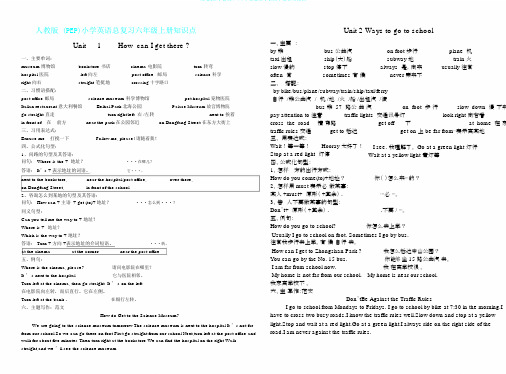
人教版 (PEP)小学英语总复习六年级上册知识点Unit1How can I get there ?一、主要单词:museum 博物馆bookstore 书店cinema 电影院turn 转弯hospital 医院left 向左post office邮局science 科学right 向右straight 笔挺地crossing 十字路口二、习惯语搭配:post office 邮局science museum 科学博物馆pet hospital 宠物医院Italian restaurant 意大利餐馆Beihai Park 北海公园Palace Museum 故宫博物院go straight 直走turn right/left 右 /左转next to 挨着in front of... 在 ...前方near the park 在公园邻近on Dongfang Street 在东方大街上三、习用表达式:Unit 2 Ways to go to school一、主要:by 乘bus 公共汽on foot 步行plane 机taxi 出租ship(大)船subway 地train 火slow 慢的stop 停下always 是,向来usually 往常often 常sometimes 有候never 素来不二、搭配:by bike/bus/plane/subway/train/ship/taxi/ferry自行 /乘公共汽 / 机 /地 /火 /船 /出租汽 /渡bus 乘 57 路公共汽on foot 步行slow down 慢下来pay attention to 注意traffic lights 交通讯号灯look right 向右看cross the road横穿路get off下at home 在家traffic rules 交通get to 抵达get on 上be far from⋯表示离某地Excuse me打搅一下Follow me, please! 请随着我!四、公式化句型:1、问路的句型及其答语:问句: Where is the + 地址?···在哪儿?答语: It’s + 表示地址的词语。
人教版(PEP)小学英语六年级上册各单元知识点归纳(三年级起点)
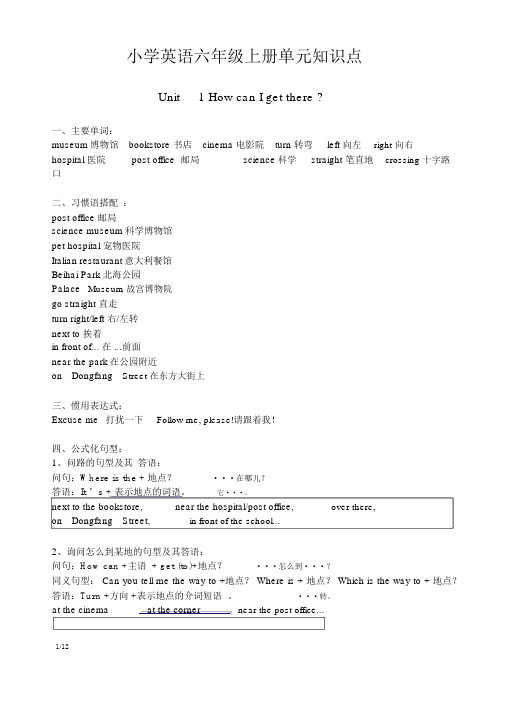
小学英语六年级上册单元知识点Unit 1 How can I get there ?一、主要单词:museum博物馆bookstore 书店cinema 电影院turn 转弯left 向左right 向右hospital 医院post office 邮局science科学straight 笔直地crossing 十字路口二、习惯语搭配:post office 邮局science museum科学博物馆pet hospital 宠物医院Italian restaurant意大利餐馆Beihai Park 北海公园Palace Museum 故宫博物院go straight 直走turn right/left 右/左转next to 挨着in front of... 在 ...前面near the park在公园附近on Dongfang Street 在东方大街上三、惯用表达式:Excuse me打扰一下Follow me, please!请跟着我!四、公式化句型:1、问路的句型及其答语:问句:Where is the + 地点?···在哪儿?答语:It ’s + 表示地点的词语。
它···。
next to the bookstore,near the hospital/post office,over there,on Dongfang Street,in front of the school...2、询问怎么到某地的句型及其答语:问句:How can +主语 + get (to)+地点?···怎么到···?同义句型: Can you tell me the way to +地点? Where is + 地点? Which is the way to + 地点?答语:Turn +方向 +表示地点的介词短语。
2020人教PEP版英语六年级下册第四单元知识点梳理 附复习要点Unit4 Then and now
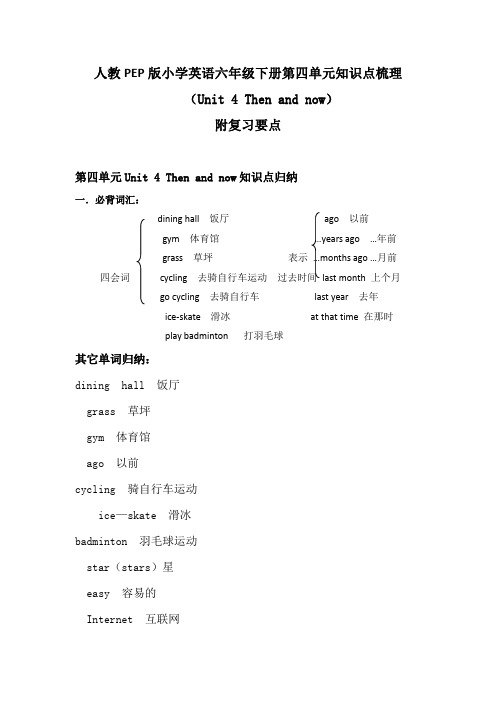
人教PEP版小学英语六年级下册第四单元知识点梳理(Unit4Then and now)附复习要点第四单元Unit4Then and now知识点归纳一.必背词汇:dining hall饭厅ago以前gym体育馆…years ago…年前grass草坪表示…months ago…月前四会词cycling去骑自行车运动过去时间last month上个月go cycling去骑自行车last year去年ice-skate滑冰at that time在那时play badminton打羽毛球其它单词归纳:dining hall饭厅grass草坪gym体育馆ago以前cycling骑自行车运动ice—skate滑冰badminton羽毛球运动star(stars)星easy容易的Internet互联网different(same)不同的(相同的)active积极活跃的;race赛跑nothing没有什么think—thought想feel—felt感觉cheetah猎豹trip绊倒wake—woke醒dream梦star星easy容易的look up查阅Internet互联网different不同的active活跃的race赛跑nothing没有什么thought想felt感觉cheetah猎豹trip绊倒woke醒wake up醒来短语归纳:go cycling去骑自行车play badminton打羽毛球look up查阅last month/year上月/去年at night在晚上play basketball打篮球use the Internet使用互联网wear glasses戴眼镜dream梦win the race赢得比赛have a race with…和…进行一场赛跑一、句子归纳:1、There was no library in my old school.我以前的学校里没有图书馆。
pep人教版六年级知识点汇总

pep人教版六年级知识点汇总PEP(人教版)六年级是小学最后一年的学习阶段,为了帮助同学们更好地复习和总结所学的知识,特将六年级的知识点进行了汇总和归纳。
以下是PEP人教版六年级知识点的概要:1. 语文知识点:1.1 诗歌鉴赏:学习朗诵、鉴赏古今中外的不同种类的诗歌,如诗经、唐诗、现代诗等。
1.2 阅读理解:通过阅读文章来获取信息、理解文章的主题、推理、判断、归纳和总结文章的内容。
1.3 写作能力:学习写作的基本规范和技巧,如选择合适的标题、构思段落、使用修辞手法等。
2. 数学知识点:2.1 四则运算:包括加法、减法、乘法和除法,以及运算顺序、运算规律等。
2.2 小数和分数:学习小数和分数的概念,进行小数和分数之间的转换,以及小数和分数的加减乘除运算。
2.3 图形与计量:认识常见的平面图形和立体图形,测量物体的长度、面积、体积等。
3. 英语知识点:3.1 词汇与语法:掌握日常生活中常用的词汇,学习各种时态的用法和句子结构。
3.2 听力与口语:通过听力训练和口语练习提高听力和口语表达能力。
3.3 阅读和写作:学习阅读理解技巧,提高阅读理解能力,以及书写简单的英语文章。
4. 科学知识点:4.1 动物植物与生物:学习不同生物的特性、结构和生长发育过程。
4.2 天文与地理:认识地球的地理特征,了解太阳系中的行星和卫星。
4.3 环境与健康:学习环境保护和健康知识,了解环境对人类的重要性。
5. 社会知识点:5.1 国内和国际:了解中国的历史、地理和文化,学习国际上的一些知名国家和地区。
5.2 社会组织:了解国家政府机构、学校、家庭等社会组织的功能和作用。
5.3 现代科技:了解科学技术在现代社会中的应用和影响。
以上是PEP人教版六年级知识点的简要概述,希望同学们能够通过复习和总结,巩固所学的知识,为将来的学习打下坚实的基础。
祝同学们学习进步,取得优异的成绩!。
新PEP小学英语六年级上册复习资料
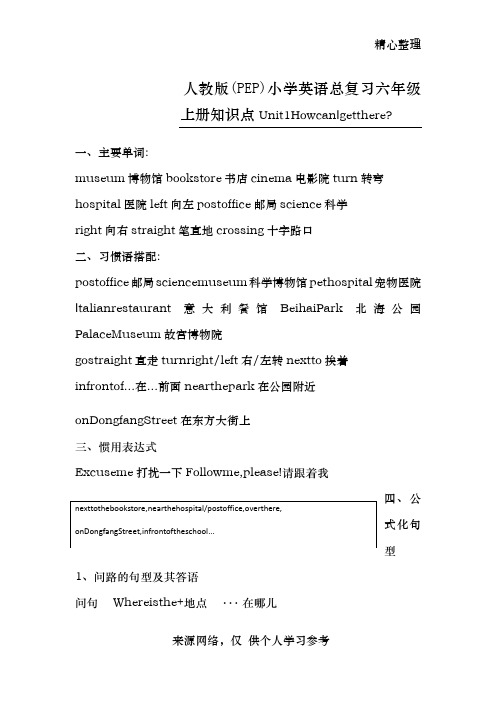
精心整理人教版(PEP)小学英语总复习六年级上册知识点Unit1Howcan I getthere? 一、主要单词:museum 博物馆bookstore 书店cinema 电影院turn 转弯:sciencemuseum talianrestaurantExcuseme 打扰一下 1Whereisthe+nexttothebookstore,nearthehospital/postoffice,overthere,I t’s+表示地点的词语。
它···。
2Howcan+主语+get(to)+the+Canyoutellmethewayto+Whereis+Whichisthewayto+Turn+方向+表示地点的介词短语。
atthecinemaatthecornernearthepostoffice...Whereisthecinema,please?I t’snexttothehospital.它与医院相邻。
Turnleftatthecinema,thengostraight.I t’sontheleft.在电影院向1、Whereisthemuseumshop?博物馆商店在哪里?I t’snearthedoor.他在门附近。
2、Whereisthepostoffice?邮局在哪里?I t’snexttothemuseum.它与博物馆相邻。
3、Whereistherestaurant?餐馆在哪里?I t’snexttothetheparkonDongfangStreet.它与东方街上的公园相邻。
Unit2Waystogotoschoolby乘bus公共汽车onfoot步行plane飞机taxi出租车ship subway地铁train火车slow慢的stop停下always usually通常often经常sometimes有时候never从来不,永不Wait Hooray I see.绿灯行Stopataredlight红灯停Waitatayellowlight1Howdoyoucome(to)+2、如何用must某人+must++.···必须···。
六年级英语-上册复习资料(1)

人教版(PEP)小学英语总复习六年级上册知识点Unit 1 How can I get there ?一、主要单词:museum博物馆bookstore书店cinema电影院turn 转弯hospital医院left向左post office 邮局science科学right向右straight笔直地crossing十字路口二、习惯语搭配:post office邮局science museum科学博物馆pet hospital宠物医院Italian restaurant意大利餐馆Beihai Park北海公园Palace Museum故宫博物院go straight直走turn right/left右/左转next to挨着in front of。
..在。
.。
前面near the park在公园附近on Dongfang Street在东方大街上三、惯用表达式:Excuse me 打扰一下Follow me, please!请跟着我!四、公式化句型:1、问路的句型及其答语:问句:Where is the + 地点? ···在哪儿?答语:It’s + 表示地点的词语。
它在···。
例句:where is the cinema?It’s next to the bookstore。
2、询问怎么到某地的句型及其答语:问句:How can +主语+ get (to)+地点?···怎么到···?例句:How can I get to the bookstore?同义句型:Can you tell me the way to +地点?Where is + 地点?Which is the way to +地点?答语:Turn +方向+表示地点的介词短语。
···转.例句:turn right at the hospital.五、例句:Where is the cinema, please?请问电影院在哪里?It's next to the hospital. 它与医院相邻。
Unit3必备知识(复习讲义)六年级英语上册(人教PEP版)

—We are going to the cinema.我们打算去电影院。
3.—When are you going?你们什么时候去?
—Next Wednesday.下周三。
4.I have to do my homework now.现在我不得不要做我的作业了
13. do homework做作业14. have to必须;不得不
15. this morning今天早晨16. this afternoon今天下午
17. this evening今天晚上18. go ice-skating去滑雪
19. make a snowman堆雪人20. go for a picnic去野餐
21. be afraid of...害怕...... 22. Mid-Autumn Festival中秋节
23. comic book连环画册
必背句型
四会
1.—What are you going to do tomorrow?你明天打算做什么?
—I’m going to have an art lesson.我要去上美术课。
31.听起来不错
32.做作业
33.必须;不得不
34.今天早晨
35.今天下午
36.今天晚上
37.去滑雪
38.堆雪人
39.去野餐
40.害怕......
41.中秋节
42.连环画册
二、句子
1.—你明天打算做什么?
—我要去上美术课。
2.—你们打算去哪?
—我们打算去电影院。
3.—你们什么时候去?
—下周三。
4.现在我不得不要做我的作业了。
人教版PEP小学英语六年级知识要点及习题总复习讲义

山林小学…○…………密…………封…………线…………内…………不…………要…………答…………题…………○………学校 准考证号: 姓名: 班级:人教版PEP 小学英语六年级知识要点及习题总复习讲义名词复数规则1.一般情况下,直接加-s ,如:book-book s ,bag-bag s ,cat-cat s ,bed-bed s 2.以s.x.sh.ch 结尾,加-es,如:bus-bus es ,box-box es ,peach-peach es , watch-watch es 3.以“辅音字母+y ”结尾,变y 为i, 再加-es,如: famil y -famil ies , strawberr y -strawberr ies4.以“f 或fe ”结尾,变f 或fe 为v, 再加-es ,(但有一个特例:roof →roofs )。
如: kni fe -kni ves lea f -lea ves wife-wives thief-thieves wolf-wolves5.以“o ”结尾的单词,如果有生命,加-es ;如果没有生命,加-s 。
如:①有生命:potato-potato es tomato-tomato esmango-mango es (芒果)hero-hero es (英雄) Negro- Negro es (黑人)②没生命:radio-radio s piano-piano s photo-photo s zoo-zoo s6.不规则名词的复数变化: (一)完全不规则:m a n-m e n woman-women policeman-policemenpolicewoman-policewomen mouse-mice child-children f oo t-f ee t tooth-teeth goose-geese (二)单数复数同形:fish-fish sheep-sheep deer-deer people-peopleChinese-Chinese Japanese-Japanese小练习:写出下列各词的复数I _______ him ______ this ______ her ______ watch _______ child ______ photo ______ diary______day______foot_______ book______ dress _____tooth______ sheep ______box_____ strawberry ________ leaf ____ potato ______ peach______ bus ______ man______ woman______ paper_______ juice______ water________ milk________ rice__________ tea__________一般现在时态一般现在时基本用法介绍 1.一般现在时的功能1).表示事物或人物的特征、状态。
人教版pep六年级英语最新最全总复习总结知识点

六年级总复习-系统知识一、词汇Ⅰ一般过去时态一般过去时态表示在过去的某个时间发生的动作或存在的状态,常和表示过去的时间状语连用。
例如yesterday, last weekend ,last Saturday ,等连用。
基本句型:主语+动词的过去式+其他。
例句——What did you do last weekend?你上周做什么了?——I played football last weekend.我踢足球了。
★规则动词过去式的构成⒈一般在动词原形末尾加-ed。
例如:play—played⒉词尾是e的动词直接加-d。
例如:dance—danced⒊末尾只有一个辅音字母的重读闭音节词,先双写这个辅音字母,再加-ed。
例如stop (停止)--stopped⒋结尾是“辅音字母+y”的动词,变“y”为“i”,再加-ed,例如:study--studied★一些不规则变化的动词过去式am/is—was are—were go—went swim—swam fly—flew do—did have—had say—said see—saw take—took come—came become—became get—got draw—drew hurt—hurt read—read tell—told will—would eat—ate take—took make—made drink—drank sleep(睡觉)—slept cut(切)--cut sit(坐)—sat begin(开始)—began think—thought find—found run(跑)---ran buy—bought win—won give(给)—gave sing—sang leave—left hear(听)--heart wear—wore Ⅱ一般现在时态一般现在时态表示包括现在时间在内的一段时间内经常发生的动作或存在的状态,表示习惯性或客观存在的事实和真理。
人教版PEP小学英语六年级上册期中复习知识点总结

人教版PEP小学英语六年级上册期中复习知识点总结Unit1 How can I get there?【重点词汇】science科学museum博物馆bookstores书店cinema电影院hospital医院crossing十字路口turn转弯left左straight笔直地right右post office邮局go straight直走【巧记单词】(一)我的家乡建筑多,快来听我说一说。
science museum真奇妙,里面知识真不少。
到post office把信寄,到bookstore来看书。
到cinema看电影,hospital医生忙。
(二)站在crossing 辨方向,左转右转要分清。
turn left向左转,turn right向右转。
直走也要记清楚,直走直走go straight。
【习惯搭配】buy a postcard 买一张明信片get there 到那儿near the door 在大门附近go straight 直走next to 挨着turn left 左转an interesting film 一部有趣的电影turn right 右转【惯用表达】1.I don't know. 我不知道。
2.Follow me, please! 请跟着我!3. Excuse me. 对不起,打扰一下。
4. Let's go! 我们走吧!【重点句型】1. 询问某地在哪:-Where is + 地名? -It's + 方位词+ 其他. eg: -Where is the post office?邮局在哪儿?-It's near the school.在学校附近。
2. 询问如何到达某地:-How can I get to + 地名?eg: ⑴-How can I get to the school? 我怎样才能到达学校?-Go straight and turn left.直走然后左转。
人教版(PEP)小学英语六年级上册各单元知识点归纳(三年级起点)
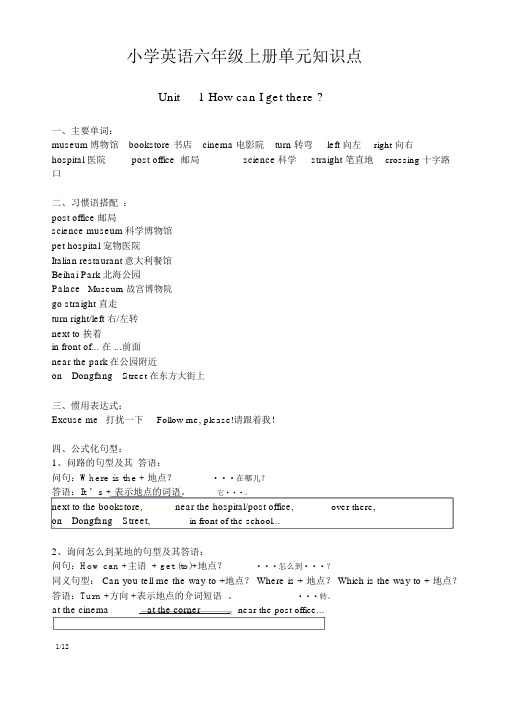
小学英语六年级上册单元知识点Unit 1 How can I get there ?一、主要单词:museum博物馆bookstore 书店cinema 电影院turn 转弯left 向左right 向右hospital 医院post office 邮局science科学straight 笔直地crossing 十字路口二、习惯语搭配:post office 邮局science museum科学博物馆pet hospital 宠物医院Italian restaurant意大利餐馆Beihai Park 北海公园Palace Museum 故宫博物院go straight 直走turn right/left 右/左转next to 挨着in front of... 在 ...前面near the park在公园附近on Dongfang Street 在东方大街上三、惯用表达式:Excuse me打扰一下Follow me, please!请跟着我!四、公式化句型:1、问路的句型及其答语:问句:Where is the + 地点?···在哪儿?答语:It ’s + 表示地点的词语。
它···。
next to the bookstore,near the hospital/post office,over there,on Dongfang Street,in front of the school...2、询问怎么到某地的句型及其答语:问句:How can +主语 + get (to)+地点?···怎么到···?同义句型: Can you tell me the way to +地点? Where is + 地点? Which is the way to + 地点?答语:Turn +方向 +表示地点的介词短语。
- 1、下载文档前请自行甄别文档内容的完整性,平台不提供额外的编辑、内容补充、找答案等附加服务。
- 2、"仅部分预览"的文档,不可在线预览部分如存在完整性等问题,可反馈申请退款(可完整预览的文档不适用该条件!)。
- 3、如文档侵犯您的权益,请联系客服反馈,我们会尽快为您处理(人工客服工作时间:9:00-18:30)。
山林小学人教版PEP山林小学英语六年级知识要点及习题总复习讲义名词复数规则1.一般情况下,直接加-s,如:book-book s,bag-bag s,cat-cat s,bed-bed s2.以s.x.sh.ch结尾,加-es,如:bus-bus es,box-box es,peach-peach es, watch-watch es3.以“辅音字母+y”结尾,变y为i, 再加-es,如:famil y-famil ies, strawberr y-strawberr ies4.以“f或fe”结尾,变f或fe为v, 再加-es,(但有一个特例:roof→roofs)。
如: kni fe-kni ves lea f-lea ves wife-wivesthief-thieves wolf-wolves5.以“o”结尾的单词,如果有生命,加-es;如果没有生命,加-s。
如:①有生命:potato-potato es tomato-tomato esmango-mango es(芒果)hero-hero es(英雄)Negro- Negro es (黑人)②没生命:radio-radio s piano-piano s photo-photo szoo-zoo s6.不规则名词的复数变化:(一)完全不规则:m a n-m e n woman-women policeman-policemenpolicewoman-policewomen mouse-mice child-children f oo t-f ee t tooth-teeth goose-geese(二)单数复数同形:fish-fish sheep-sheep deer-deerpeople-peopleChinese-Chinese Japanese-Japanese 小练习:写出下列各词的复数I _______ him ______ this ______ her ______ watch _______ child ______ photo ______ diary______day______foot_______ book______ dress _____tooth______ sheep ______box_____ strawberry ________ leaf ____ potato ______ peach______ bus ______ man______ woman______ paper_______ juice______ water________ milk________ rice__________ tea__________一般现在时态一般现在时基本用法介绍1.一般现在时的功能1).表示事物或人物的特征、状态。
如:The sky is blue.天空是蓝色的。
2).表示经常性或习惯性的动作。
如:I get up at six every day.我每天六点起床。
3).表示客观现实。
如:The earth goes around the sun.地球绕着太阳转。
2.一般现在时的构成1).be动词:主语+be(am,is,are)+其它。
如:I am a boy.我是一个男孩。
2).行为动词:主语+行为动词(+其它)。
(1)当主语为第一、第二人称或复数做主语时,谓动是原形。
如: I like English.我喜欢英语。
We study English.我们学习英语。
(2)当主语为第三人称(he, she,it)或单数时,要在动词后加"-s"或"-es"。
如: Mary like s Chinese.玛丽喜欢汉语。
山林小学3.一般现在时的变化A、be 动词的变化a.肯变否句,有be动词is\am\are\was\were,直接在is\am\are 动词后加not。
(注:我(I)用am,你(you)用are,is跟着他、她、它,单数和不可数名次用is,复数用are)如:He is not a worker.他不是工人。
b.肯变一般疑问句:Is\Am\are+主语+其它 ?(注:I\We变you,you 变I\we,其他人称不变)如:-I am a student.→-Are you a student?(注:一般疑问句有肯定和否定回答)-Yes,I am./ No,I'm not.c.特殊疑问句:疑问词(How\What\Where\When\How many...)+一般疑问句?(注:特殊疑问句直接回答)如:Where is my car? It’s under the chair.B.行为动词的变化。
a.肯变否定句:主语(第一、第二人称或复数)+ don't +动词原形(+其它)。
如:I don't like bread.当主语为第三人称单数时,要用doesn't构成否定句。
如:He doesn't often play computer games.b.肯变一般疑问句:Do( Does ) +主语+动词原形+其它?当主语为第一、第二人称或复数时用助动词Do构成一般疑问句。
如:- Do you often play football?- Yes, I do. / No, I don't.当主语为第三人称或单数时,要用Does构成一般疑问句。
如: - Does she go to work by bike?- Yes, she does. / No, she doesn't.c.特殊疑问句:疑问词+一般疑问句。
如:How does your father go to work?4.动词第三人称单数加"-s"或"-es"形式的变化规则1.一般情况下,直接加-s,如:play-plays, work-works.2.以s. x. sh. ch. o结尾,加-es,如:guess-guesses, wash-washes, watch-watches, go-goes,do-does3.以“辅音字母+y”结尾,变y为i, 再加-es,如:study-studies.4.以不发音的e结尾,直接加-s .如:make-makes.5.特殊词have-has.一般现在时用法专项练习:一、写出下列动词的第三人称单数drink ________ go ______ stay ______ make ______look _______ have_______ pass______ carry ______come______ watch______ plant_______ fly _______study_______ brush_______ do________ teach_______like_________二、用括号内动词的适当形式填空。
1.He often ________(have) dinner at home.2.Daniel and Tommy _______(be) in Class One.3.We _______(not watch) TV on Monday.4.Nick _______(not go) to the zoo on Sunday.5.______ they ________(like) the World Cup?6.What _______they often _______(do) on Saturdays?7._______ your parents _______(read) newspapers every day?8.The girl _______(teach) us English on Sundays.9.She and I ________(watch) TV together every evening.10.There ________(be) some water in the bottle.11.Mike _______(like) cooking.山林小学12.They _______(have) the same hobby.13.My aunt _______(look) after her baby carefully.14.You always _______(do) your homework well.15.I _______(be) ill. I’m staying in bed.16.She _______(go) to school from Monday to Friday.17.Liu Tao _______(do not) like PE.18.The child often _______(watch) TV in the evening.19.Su Hai and Su Yang _______(have) eight lessons this term.20.-What day _______(be) it today? - It’s Saturday.三、按照要求改写句子1.Daniel watches TV every evening.(改为否定句)___________________________________________________2.I am a teacher.(改为一般疑问句,并作否定回答)____________________________________________________3.She likes milk.(改为一般疑问句,作肯定回答)___________________________________________________4.Amy likes playing computer games.(改为一般疑问句,作否定回答)___________________________________________________5.We go to school every morning.(改为否定句)_______________________________________________________6.He speaks English very well.(改为否定句)___________________________________________________7.I like taking pictures on the holiday.(对划线部分提问) _______________________________________________________8.John comes from Canada.(对划线部分提问)___________________________________________________9.She is always a good student.(改为一般疑问句,作否定回答) _______________________________________________________ 10.Simon and Daniel like going skating.(改为否定句)___________________________________________________四、改错(划出错误的地方,将正确的写在横线上)1. Is your brother speak English?__________________________________________________2. Does he likes going fishing?__________________________________________________3. He likes play games after class.__________________________________________________4. Miss wei teachs us English.__________________________________________________5. She don’t do her homework on Sundays._________________________________________________现在进行时态1.现在进行时表示事情现在正在进行或发生的动作,也可表示当前一段时间内的活动或现阶段正在进行的动作。
